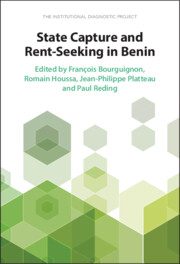Acknowledgements
We wish to acknowledge the precious help the editors and authors of this study received from many friends and colleagues. In the first place, the editors would like to thank Tatiana Goetghebuer, who has chiefly managed this project from the beginning until the end, not only making sure that drafts were handed over on time and organising meetings, workshops, and seminars, but also providing valuable reflections on the design of the institutional survey and contributing to the training of enumerators in the field. This study would not have been completed without Tatiana’s professionalism, devotion, and friendliness. Thanks again, Tatiana.
Another special debt has to be addressed to the research assistant, Alain Babatoundé, who has provided valuable help and greatly assisted the study. Thanks, Alain, for your unconditional availability and constant support throughout this project. We also wish to thank the advisors (Alexandre Biaou, John Igué, Mathias Hounkpe, Sebastien Sotindjo, Léonard Wantchekon, and Etienne Yehoue), whose guardianship and advisory role on this work ensured it was of high quality, informed by a diverse set of viewpoints, and situated in the reality of the Beninese context. They contributed to the draft background paper presented in the engagement workshops held at Cotonou in August 2017. The first two chapters of this volume use some material contained in that draft. We would like to thank them for contributing to that earlier draft. Moreover, our gratitude goes to Léonard Wantchekon for specific suggestions at different stages in the development of the study. Special thanks are also gratefully extended to Alexandre Biaou, then director of the National Institute of Statistics and Economic Analysis, for partnering with the EDI programme on the implementation of the Country Institutional Survey, which is featured in Chapter 3 of this volume. We are also grateful to the enumerators and supervisors who helped during the expert opinion survey.
The members of the Scientific Committee of EDI’s institutional diagnostic research activity, Arne Bigsten, Célestin Monga, and Benno Ndulu, must also be acknowledged for the crucial role they played in critically challenging the process and conclusions of the study, pushing authors to produce high-quality research. We must also acknowledge the EDI team members at Oxford Policy Management, who contributed valuable insights and provided a management function to the process, including Mark Henstridge, Benjamin Klooss, Rachel Smith-Phiri, Stevan Lee, and Umar Salam. We also thank the Aide à la Décision Economique team led by Tatiana Goetghebuer and including Jean-Marie Watthelet, Karin Durviaux, Ombeline de Bock, and Khadija Berada. We would specifically like to acknowledge Karin Durviaux for her coordination support for the organisation of key events, including the Grand Popo workshop in March 2019.
We are extremely grateful to Ms Marie Odile Attanasso, the Ministre de l’Enseignement Supérieur et de la Recherche Scientifique du Bénin, who made time to speak to us and supported us during the various workshops we organised in Benin. We must also express our gratitude to her successor, Ms Eléonore Yayi, for the invaluable support extended during the dissemination workshop held in January 2020 in Cotonou. We also wish to thank government officials who participated in the workshops and provided insights that helped us understand a number of issues related to the development challenges Benin is facing: Achile Houssou, Aristide Medenou, Victorien Kougblénou, Armand Chabi, and Djibril Akambi Moussa-Fils.
There remain a few individuals whom we must single out for their contributions to the thinking and analysis underlying the Benin institutional diagnostic. We would like to acknowledge the friends and colleagues (Marijke Verpoorten, Modeste Dayé, Elena Briones Alonso, Kelbesa Megersa, Priscilla Toffano, and Patrice Kpadé) who provided insightful comments on the work. We also wish to thank academics who participated in the workshops in August 2017 in Cotonou and/or in March 2019 in Grand Popo: Yasid Dissou, Emilia Tingbe-Azalou, Biaou Gauthier, Christophe Codjo Kougnianzonde, Rogatien Tossou, Ilyass Sina, Mohamed Baco, and Rachidi Kotchoni. Cyriaque Edon and Albert Honlonkou must be specially acknowledged for providing valuable reflections on the design of the institutional survey.
We must acknowledge the decision makers (in the private and public sectors, representatives from international organisations and donors in Benin, as well as from civil society) who participated in the institutional survey in 2018 and also the policy engagement workshop in August 2017. The list is too long to name all of you.
The EDI programme management team at Oxford Policy Management and ADE also wish to extend their thanks to the editors of the Benin institutional diagnostic (François Bourguignon, Romain Houssa, Jean-Philippe Platteau, and Paul Reding) for their dedication, professionalism, and enthusiasm. We thank François Bourguignon moreover for his overall leadership of EDI’s institutional diagnostic component, without which this study would not have been possible. Finally, a special thank-you goes to Romain Houssa, the principal investigator of the Benin project, for coordinating the Benin study – his leadership has been critical at each stage of this project, from the exploratory mission in Benin (May 2016) to today. This project would not have been possible without his personal engagement.
This project was funded with UK aid from the UK government.

